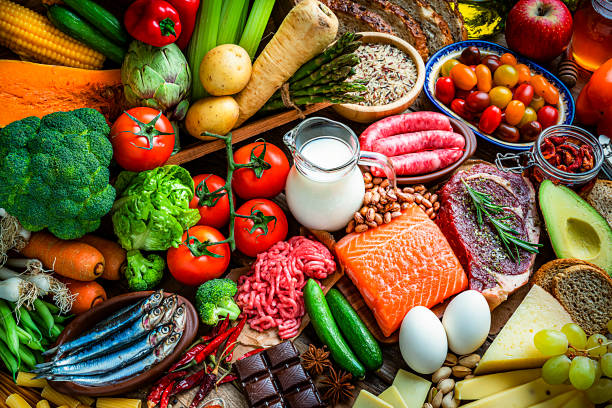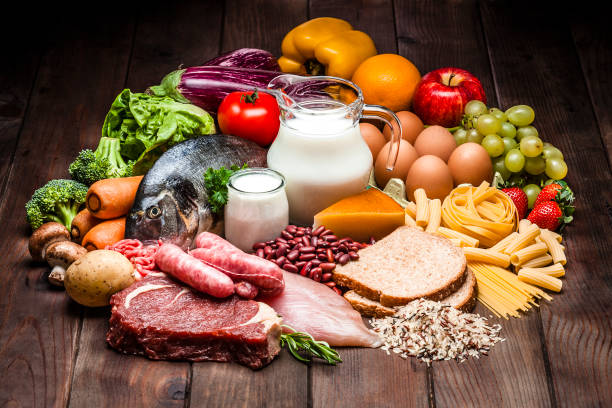Polycystic Ovary Syndrome, more commonly known as PCOS, is more than just a medical condition—it’s a lived experience for millions of women around the world. It can bring with it a spectrum of symptoms: irregular periods, acne, excessive hair growth, difficulty losing weight, infertility struggles, and even mood changes. Yet beneath these surface-level signs lies a complex hormonal imbalance that disrupts not only reproductive health but also metabolic health.
For many women, receiving a diagnosis of PCOS can feel overwhelming. It often comes after years of frustration—missed cycles, unexplained weight gain, or infertility heartbreak. While there is no “cure” for PCOS, science shows us that it can be managed. And among the most powerful tools available, diet plays a central role.
This article is not about fad diets, miracle cures, or quick fixes. Instead, it explores what rigorous science and clinical practice reveal: how nutrition shapes hormonal health, how evidence-based meal planning can improve symptoms, and how women with PCOS can use food not just to survive with the condition but to thrive.
The Science of PCOS and Why Diet Matters
To understand why diet is so crucial, one must first grasp the underlying biology of PCOS. At its core, PCOS is a hormonal and metabolic disorder. It is characterized by three main features:
- Irregular or absent ovulation, leading to fertility challenges.
- Elevated androgen levels, which can cause acne, hair loss on the scalp, and unwanted facial or body hair.
- Polycystic ovaries visible on ultrasound, although this feature alone is not enough for diagnosis.
Beneath these symptoms lies insulin resistance—a condition in which the body’s cells do not respond efficiently to insulin, the hormone that regulates blood sugar. Insulin resistance is present in up to 70% of women with PCOS. High insulin levels drive the ovaries to produce more androgens, worsening symptoms and creating a vicious cycle.
This is where diet enters the picture. Food directly influences blood sugar, insulin levels, and inflammation—three pillars that shape the course of PCOS. By choosing the right foods in the right combinations, women can stabilize hormones, improve metabolism, and alleviate symptoms.
Food as Medicine for PCOS
The concept of using food as medicine is not new, but in the case of PCOS, it is particularly powerful. Clinical studies consistently show that dietary changes can:
- Improve insulin sensitivity.
- Reduce androgen levels.
- Support weight management.
- Restore more regular menstrual cycles.
- Lower the risk of long-term complications such as type 2 diabetes and heart disease.
Unlike medications, which often target a single symptom, diet works holistically, addressing the root causes of PCOS. Every bite of food sends biochemical messages to the body, and over time, these messages accumulate into powerful outcomes.
Carbohydrates: Quality Over Quantity
One of the first things many women with PCOS hear is: cut carbs. But the truth is more nuanced. Carbohydrates are not the enemy; they are an essential source of energy. The key lies in choosing the right type of carbohydrates and balancing them within a meal.
Refined carbs—like white bread, pastries, and sugary drinks—cause rapid spikes in blood sugar, which in turn trigger insulin surges. For women with PCOS, whose bodies already struggle with insulin, this creates a metabolic storm. On the other hand, complex carbohydrates—such as oats, brown rice, quinoa, beans, and vegetables—release glucose slowly, preventing sharp insulin rises.
Scientific evidence highlights the benefits of a low-glycemic index (GI) diet for PCOS. In one clinical trial, women who followed a low-GI eating pattern experienced more regular menstrual cycles and improved insulin sensitivity compared to those on a standard diet. This doesn’t mean cutting out carbs entirely, but rather learning to distinguish between those that heal and those that harm.
The Power of Protein
Protein is a cornerstone of a PCOS-friendly diet. It slows digestion, reduces post-meal blood sugar spikes, and promotes satiety, which helps prevent overeating. Moreover, protein supports muscle maintenance, and muscle tissue plays a critical role in improving insulin sensitivity.
Lean protein sources such as fish, poultry, eggs, legumes, tofu, and low-fat dairy are excellent choices. Research suggests that distributing protein evenly across meals—rather than loading it all into dinner—can further stabilize blood sugar and hormones.
Some studies have even compared high-protein diets to standard diets in women with PCOS and found significant benefits in weight reduction, improved menstrual regularity, and reduced androgen levels.
Healthy Fats for Hormone Balance
For decades, dietary fat was demonized, but modern science tells a different story. Healthy fats are essential for hormone production, brain function, and inflammation control—all critical aspects for women with PCOS.
Omega-3 fatty acids, found in fatty fish like salmon and in plant sources like chia seeds and flaxseeds, are particularly beneficial. Studies show that omega-3s can reduce testosterone levels, improve insulin sensitivity, and even support fertility outcomes.
Monounsaturated fats, abundant in olive oil, avocados, and nuts, also support heart health and reduce inflammation, which tends to be elevated in PCOS. The fats to limit are trans fats and excessive saturated fats, which can worsen inflammation and cardiovascular risk.
Fiber: The Unsung Hero
Fiber may not seem glamorous, but it is one of the most powerful dietary allies for PCOS. High-fiber foods slow glucose absorption, improve satiety, and support gut health. Emerging research even suggests that the gut microbiome—trillions of bacteria residing in the intestines—plays a role in PCOS, influencing insulin sensitivity and inflammation.
Whole grains, vegetables, fruits, legumes, nuts, and seeds all provide fiber. Women with PCOS benefit from aiming for at least 25–35 grams daily, but increasing intake gradually is best to avoid digestive discomfort.
Meal Timing and Blood Sugar Rhythms
It’s not only what women with PCOS eat but also when they eat that can matter. Emerging studies highlight the role of meal timing in insulin sensitivity and hormone regulation.
Eating larger meals earlier in the day, with a balanced breakfast rich in protein and fiber, may improve ovulatory function in PCOS. One clinical study found that women who consumed most of their daily calories at breakfast had reduced insulin and testosterone levels compared to those who ate most of their calories at dinner.
Intermittent fasting, a popular dietary trend, shows mixed results in PCOS. Some evidence suggests that time-restricted eating can improve insulin sensitivity and support weight management, but the approach must be individualized, as overly restrictive fasting may disrupt menstrual cycles in some women.
Anti-Inflammatory Nutrition
PCOS is increasingly recognized as an inflammatory condition. Chronic low-grade inflammation contributes to insulin resistance, weight gain, and hormonal imbalances. Diet is a powerful tool for reducing this inflammation.
Anti-inflammatory foods include colorful fruits and vegetables rich in antioxidants, spices like turmeric and cinnamon, fatty fish, olive oil, and nuts. Minimizing processed foods, sugary snacks, and fried items can further calm inflammatory pathways.
The Mediterranean diet, rich in these anti-inflammatory foods, has been extensively studied and is associated with improved fertility, better metabolic outcomes, and reduced cardiovascular risk in women with PCOS.
Supplements: Science and Caution
While diet should always be the foundation, some supplements have evidence supporting their role in PCOS management. Inositol, a vitamin-like compound, has gained significant attention. Numerous studies show that myo-inositol and D-chiro-inositol can improve insulin sensitivity, restore ovulation, and reduce androgen levels.
Vitamin D deficiency is common in women with PCOS, and supplementation may improve menstrual regularity and metabolic health. Omega-3 supplements are also beneficial for those who do not consume enough fatty fish.
However, not all supplements marketed for PCOS are supported by evidence. Herbal remedies, detox teas, and unregulated products can be ineffective at best and harmful at worst. Women should always consult a healthcare professional before adding supplements.
Emotional Eating and the PCOS Mindset
Living with PCOS is not just a physical challenge but also an emotional one. The frustration of irregular cycles, weight struggles, or infertility can lead to stress, anxiety, or depression. Food often becomes intertwined with these emotions.
Many women with PCOS experience cycles of restrictive dieting followed by binge eating, fueled by guilt and despair. Evidence-based meal planning is not about deprivation but about empowerment—choosing foods that nourish the body and support long-term health.
Mindful eating practices, which involve slowing down, recognizing hunger and fullness cues, and savoring food without judgment, can be transformative. Psychological support, whether through counseling or support groups, also plays a vital role in breaking the cycle of emotional eating.
Building an Evidence-Based PCOS Meal Plan
What does an evidence-based PCOS meal plan look like in practice? It focuses on:
- Balanced macronutrients (complex carbs, lean proteins, healthy fats).
- Low-GI food choices to stabilize blood sugar.
- High fiber intake to support gut and metabolic health.
- Anti-inflammatory foods to reduce hormonal disruption.
- Sustainable meal timing that suits the individual’s lifestyle.
For example, a typical day may include:
- Breakfast: Oatmeal topped with chia seeds, walnuts, and fresh berries.
- Lunch: Grilled salmon with quinoa, roasted vegetables, and olive oil.
- Snack: Greek yogurt with ground flaxseeds.
- Dinner: Lentil and vegetable stew with a side of leafy greens.
This type of eating is flexible, culturally adaptable, and sustainable over the long term.
The Long-Term Perspective
PCOS is a lifelong condition, and so dietary management must be sustainable. Quick-fix diets may lead to short-term improvements, but they are often unsustainable and can worsen mental health. The goal is not just weight loss, although weight reduction can significantly improve symptoms, but also metabolic health, hormone regulation, and overall well-being.
By building a long-term relationship with food—one grounded in evidence, compassion, and self-care—women with PCOS can reclaim agency over their health.
Looking Ahead: The Future of Nutrition in PCOS
Science is continuously evolving, and the future of PCOS nutrition is promising. Personalized nutrition, informed by genetics, microbiome analysis, and hormone profiling, may soon allow for highly tailored meal plans. Research into plant-based diets, ketogenic approaches, and new supplements continues to expand our understanding of what works best for different women.
At the same time, awareness is growing. The stigma around PCOS is slowly being dismantled, and more resources are available to empower women with knowledge and support. Diet will remain central in this journey—not as a rigid set of rules but as a dynamic, life-affirming practice.
Conclusion: Food as a Path to Healing
Managing PCOS with diet is not about perfection. It is about progress, empowerment, and finding balance. Every meal is an opportunity to nourish the body, calm inflammation, and stabilize hormones. Over time, these small choices accumulate into powerful changes—more regular cycles, improved fertility, better energy, and greater self-confidence.
For women navigating the uncertainty and challenges of PCOS, diet offers a sense of control and hope. It is a daily practice of self-care, a way to communicate to the body: I am listening, I am nurturing, I am healing.
PCOS may not be curable, but with evidence-based nutrition, it is absolutely manageable. Food becomes more than sustenance; it becomes medicine, resilience, and empowerment—the foundation for a healthier, brighter future.






